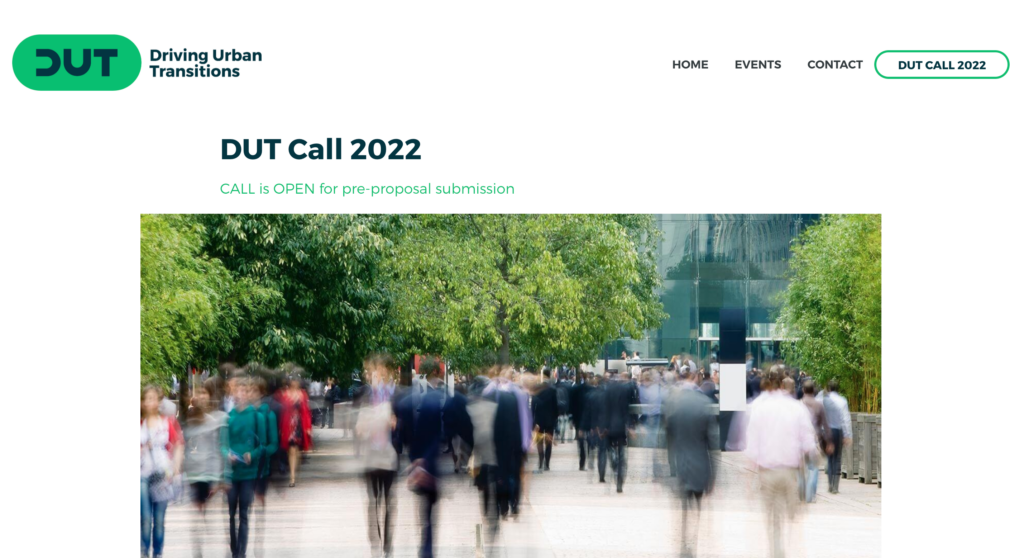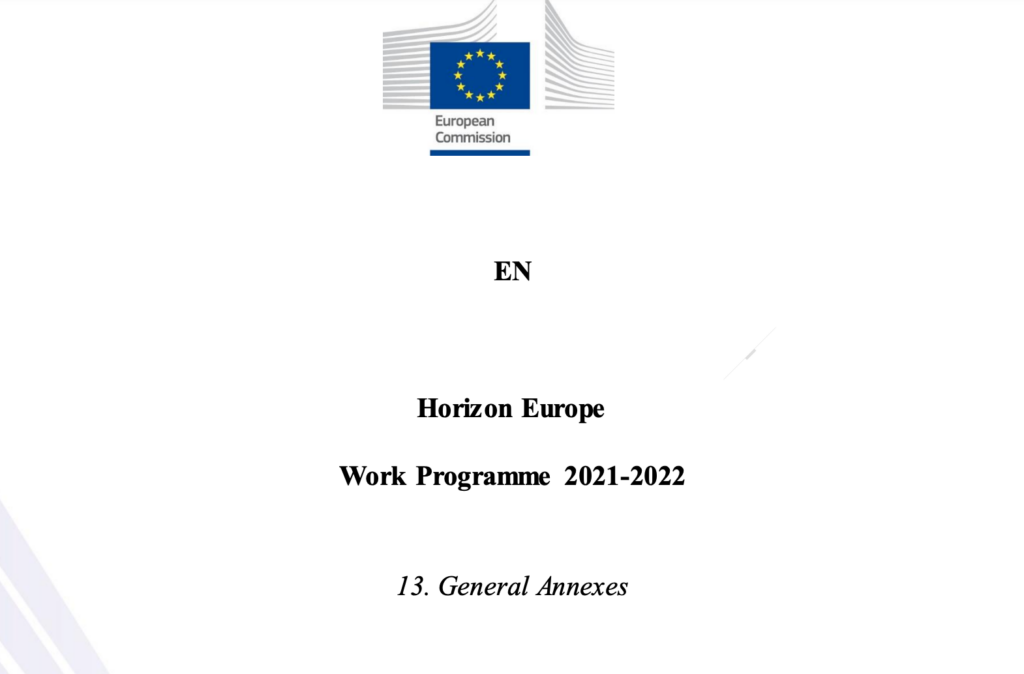A curated list of challenges, programs, funding opportunities, academic research and startups that have caught our eye.

Driving Urban Transitions (DUT) Call 2022
The purpose of this Call is to support transnational research and/or innovation projects addressing urban challenges to help cities in their transition towards a more sustainable economy and functioning. The challenges are grouped into three themes called Transition Pathways (TP): Positive Energy Districts (PED), the 15-Minute City (15mC) and Circular Urban Economies (CUE).
The projects selected within this Call will be funded directly by national/regional Funding Agencies from the following countries: Austria, Belgium, Bulgaria, Cyprus, Czech Republic, Denmark, Estonia, Finland, France, Germany, Greece, Hungary, Iceland, Italy, Latvia, Lithuania, The Netherlands, Norway, Poland, Portugal, Romania, Slovenia, Spain, Sweden, Switzerland, Turkey and the United-Kingdom.
This call is co-funded by the European Commission via the DUT Partnership (GA # 101069506) under the Horizon Europe Partnership scheme.
Each proposal must involve, at least, three partners from three countries of this list and eligible for funding by their respective national/regional Funding Agency. The added value of transnational collaboration should be clearly stated.
The Call is opened to a wide range of scientific disciplines and welcomes interdisciplinary approaches. It intends to support a large range of activities, from research to innovation and implementation. It also asks to engage explicitly stakeholders (companies, public authorities, NGOs…) in the projects and to consider users’ needs in the identification of the project goals.
Stronger grounds for pre-commercial procurement of innovative security technologies

Projects are expected to contribute to all of the following expected outcomes:
- Consolidated demand for innovative security technologies built on the aggregation of public buyers with a common need expressed in functional and/or operational terms without prescribing technical solutions;
- Better informed decision-making related to investment in innovative security technologies based on a better understanding of the potential EU-based supply of technical alternatives that could address common needs of EU public buyers;
- Better informed decision-making related to investment in innovative security technologies based on an improved visibility of the potential demand in the EU market for common security technologies;
- Increased capacity of EU public procurers to align requirements with industry and future products and to attract innovation and innovators from security and other sectors through common validation strategies, rapid innovation, experimentation and pre-commercial procurement.
- Increased innovation capacity of EU public procurers through the availability of innovative tendering guidance, commonly agreed validation strategies and evidence-based prospects of further joint procurement of common security solutions.
Projects are expected to contribute to all of the following expected outcomes:
- Enhanced analytical capacity to support the programming of EU-funded security research and capacity building funds through a periodic and timely evidence-based policy feedback ;
- Periodically aggregated and consolidated view of the capability needs and gaps in the thematic areas under consideration[1];
- Periodically aggregated and consolidated view of the state-of-the-art technologies, techniques, methods and tools that can contribute to fill the identified capability gaps;
- Periodically aggregated and consolidated view of outcomes (including on technological, industrial, legal and ethical issues), future trends, lessons learnt and best practices derived from past and current security research effort incurred in the thematic areas under consideration.
- More systematic assessment and validation of the outcomes of EU-funded security research projects with respect to identified capability gaps through harmonised support mechanisms;
- Common and updated map of opportunities and constraints for the exploitation of EU security research and innovation projects, with special focus on industrialisation, commercialisation, adoption and deployment of innovative solutions in response to common capability gaps;
- Common and updated map of areas requiring standardised solutions and/or certification schemes to foster innovation uptake and market creation, as well as trainings and options for the implementation of such schemes.
- Enhanced cooperation between research institutions, smaller private research agencies, security practitioners, SMEs and community representatives to support integrated participation in requirements determination and analysis, research and validation and evaluation of results.
Social innovations as enablers of security solutions and increased security perception

Projects’ results are expected to contribute to one or several of the following outcomes:
- Policy makers, security practitioners and researchers have increased understanding of the capabilities and capacities of local communities and citizens to contribute to developing security solutions;
- Policy makers, researchers and system developers increase the orientation of security solution development towards socially innovative and Responsible Research and Innovation approaches;
- The notions of ‘smart citizens’ and ‘smart local communities’ empowered by Responsible Research and Innovation and social innovation, where the general public co-control safety and security of their environments, are more widely adopted by decision makers;
- New benchmarks, standards or other quality criteria are established for developing security solutions through Responsible Research and Innovation[1];
- Increased collaboration across all parts of the quadruple helix (academia/research, public authorities, industry/SMEs, civil society/citizens/local communities) to develop innovations in line with the needs, values and expectations of society;
- Innovative, transferable and potentially scalable technological solutions co-created with citizens and local communities in social labs and innovation living hubs, and citizens empowered to act as generators, validators and end-users of the new horizontal technologies;
- Societal trust in security research products, their desired usefulness and social acceptability[2];
Projects are expected to contribute to some or all of the following expected outcomes:
- Integrated Nature-based solutions (NBS) into overall concepts for the protection of infrastructures and existing integrated risk management plans for cities and urban areas with a view of complementing existing methods for protection and resilience
- Adaptation and mitigation strategies for infrastructure protection applied by local authorities and operators, including lessons learned from studying reactions of natural eco-systems to different external shocks
- Resilience of local infrastructures enhanced by integrating local knowledge from population and historical documents, as well as natural components in their physical assets preventing potential damages from different types of hazards, including storms, floods and heatwaves.
- Novel construction materials and solutions resulting in more durable and damage resistant infrastructure
- Full potential of Nature-based Solutions exploited by local authorities and operators to mitigate the risks related to multiple hazards manifesting at the same time, while also taking into account social empowerment and environmental co-benefits like leisure, clean air, and immunity and response to cyberattacks etc.
TheCollabEDIT will be published on the Collabwith Magazine once per week, however, you can join the Collabwith platform to check the funding and collaboration opportunities yourself every day, or as many times you want on the Collabwith Marketplace.
If you are looking for something more specific, we can make together a “Collaboration Plan” for you and your needs. Check up here the membership options or services.
ABOUT COLLABWITH
Collabwith is a technology and a service to structure collaboration for innovation. It’s a tool to connect academics-startups-organizations. Because a tool is not enough to transform how you collaborate, here we have created a new methodology, personalized trainings, a new way of communication and a tailored made consulting for you to be more effective and efficient, now.
Grow your business and innovation through smart collaborations with Collabwith innovative and holistic approach to collaboration.
Magazine: https://collabwith.co
CollaborationXInnovation Platform: https://platform.collabwith.co
Do you want to know more? Book a demo with us, Contact us here.
